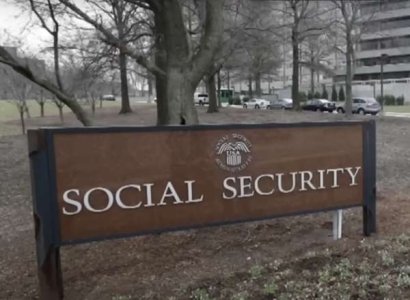Trump's new rule change could drastically affect your Social Security benefits
- Replies 0
In the ever-evolving landscape of American social welfare, a recent directive from the Trump administration has sparked a significant shift in the way Social Security benefits are distributed, potentially impacting hundreds of thousands of Americans.
As we at The GrayVine understand the importance of staying informed, let's delve into the details of this change and what it means for you, especially if you're residing in one of the states most affected by this rule change.
The traditional image of the mail carrier delivering a Social Security check may soon become a relic of the past.
President Donald Trump has mandated the Social Security Administration (SSA) to cease the issuance of benefits via paper check—a method still utilized by a considerable number of recipients.

Social Security is a lifeline for approximately 70 million Americans each month, and while the majority of these payments are electronically deposited, a small yet significant number of beneficiaries—478,000 in US states and about 7,200 in territories like Puerto Rico and Guam—still rely on physical checks.
The executive order, signed on March 25, aims to modernize the payment system by eliminating what the White House describes as “unnecessary costs,” “delays,” and heightened risks of “fraud, lost payments, theft, and inefficiencies” associated with paper checks.
The administration cites that checks are 16 times more likely to encounter issues than direct bank deposits and that the infrastructure for processing paper records cost taxpayers over $657 million in Fiscal Year 2024.
More like this: A system under pressure: What’s changing at Social Security Administration?
The transition to electronic payments will not be felt evenly across the country.
California tops the list with 51,649 individuals still receiving mailed benefits, followed by Texas wit
h 35,504, and New York with 30,676.
Despite these numbers, it's worth noting that in every state, over 99 percent of Social Security recipients already receive their benefits through Direct Deposit.
The Trump administration's push for efficiency doesn't stop with this directive.
Alongside the Department of Government Efficiency (DOGE), there have been announcements of staff reductions and new protocols for identity verification for those applying for benefits or changing their direct deposit information.
If you're among those who receive Social Security or Supplemental Security Income (SSI) benefits and have a bank account, transitioning to Direct Deposit is straightforward. Here are the steps you can take:
More like this: Is Social Security at risk? Why lawmakers are raising concerns over DOGE’s sudden changes
The administration is clear in its position: 'The continued use of paper-based payments by the Federal Government... imposes unnecessary costs; delays; and risks of fraud, lost payments, theft, and inefficiencies.”
The Treasury Department will discontinue sending physical checks starting September 30, 2025.
This gives beneficiaries ample time to make the necessary arrangements to ensure a seamless transition to electronic payments.
 Have you been affected by this change, or do you have concerns about switching to Direct Deposit? Perhaps you have a story to share about how you or a loved one navigated this transition. We invite you to join the conversation in the comments below.
Have you been affected by this change, or do you have concerns about switching to Direct Deposit? Perhaps you have a story to share about how you or a loved one navigated this transition. We invite you to join the conversation in the comments below.
BEWARE: This fraud scheme could put your Social Security at risk
As we at The GrayVine understand the importance of staying informed, let's delve into the details of this change and what it means for you, especially if you're residing in one of the states most affected by this rule change.
The traditional image of the mail carrier delivering a Social Security check may soon become a relic of the past.
President Donald Trump has mandated the Social Security Administration (SSA) to cease the issuance of benefits via paper check—a method still utilized by a considerable number of recipients.

President Trump has ordered Social Security payments to cease being issued via paper check, impacting hundreds of thousands of Americans. Image source: PBS NewsHour / YouTube
Social Security is a lifeline for approximately 70 million Americans each month, and while the majority of these payments are electronically deposited, a small yet significant number of beneficiaries—478,000 in US states and about 7,200 in territories like Puerto Rico and Guam—still rely on physical checks.
The executive order, signed on March 25, aims to modernize the payment system by eliminating what the White House describes as “unnecessary costs,” “delays,” and heightened risks of “fraud, lost payments, theft, and inefficiencies” associated with paper checks.
The administration cites that checks are 16 times more likely to encounter issues than direct bank deposits and that the infrastructure for processing paper records cost taxpayers over $657 million in Fiscal Year 2024.
More like this: A system under pressure: What’s changing at Social Security Administration?
The transition to electronic payments will not be felt evenly across the country.
California tops the list with 51,649 individuals still receiving mailed benefits, followed by Texas wit
h 35,504, and New York with 30,676.
Despite these numbers, it's worth noting that in every state, over 99 percent of Social Security recipients already receive their benefits through Direct Deposit.
The Trump administration's push for efficiency doesn't stop with this directive.
Alongside the Department of Government Efficiency (DOGE), there have been announcements of staff reductions and new protocols for identity verification for those applying for benefits or changing their direct deposit information.
If you're among those who receive Social Security or Supplemental Security Income (SSI) benefits and have a bank account, transitioning to Direct Deposit is straightforward. Here are the steps you can take:
- Set up or update Direct Deposit online (for Social Security benefits only).
- Contact your bank, credit union, or savings and loan association.
- Call Social Security toll-free at 1-800-772-1213 (TTY: 1-800-325-0778).
- Visit your local Social Security Field Office.
More like this: Is Social Security at risk? Why lawmakers are raising concerns over DOGE’s sudden changes
The administration is clear in its position: 'The continued use of paper-based payments by the Federal Government... imposes unnecessary costs; delays; and risks of fraud, lost payments, theft, and inefficiencies.”
The Treasury Department will discontinue sending physical checks starting September 30, 2025.
This gives beneficiaries ample time to make the necessary arrangements to ensure a seamless transition to electronic payments.
Key Takeaways
- President Trump has ordered Social Security payments to cease being issued via paper check, impacting hundreds of thousands of Americans.
- The move is expected to reduce costs, delays, and risks associated with physical checks, such as fraud and loss.
- Californians are the most affected by the change, with over 51,000 recipients still receiving paper checks for their Social Security benefits.
- Beneficiaries are encouraged to sign up for bank payments, and the Treasury Department will stop sending physical checks from September 30, 2025.
BEWARE: This fraud scheme could put your Social Security at risk






